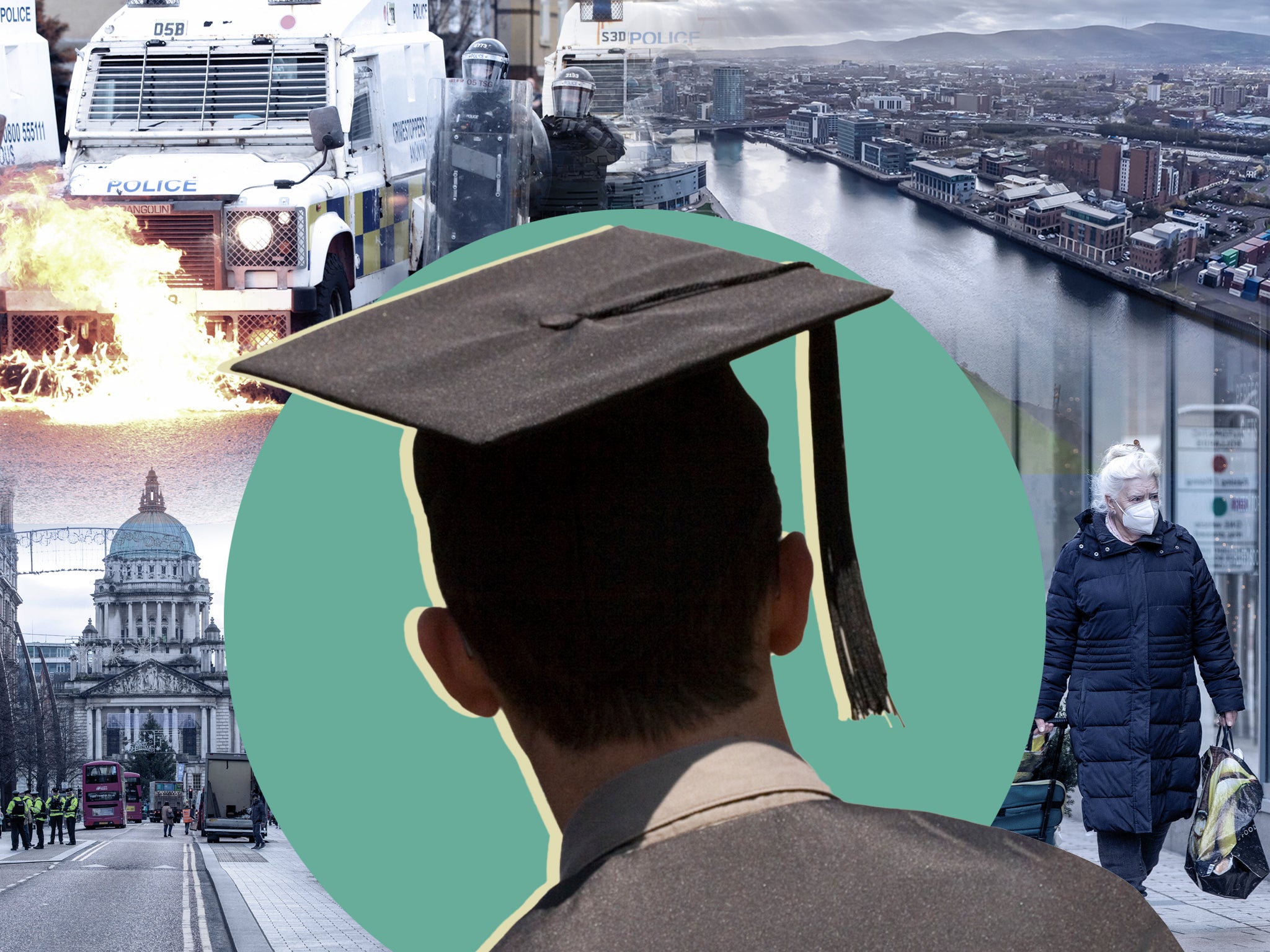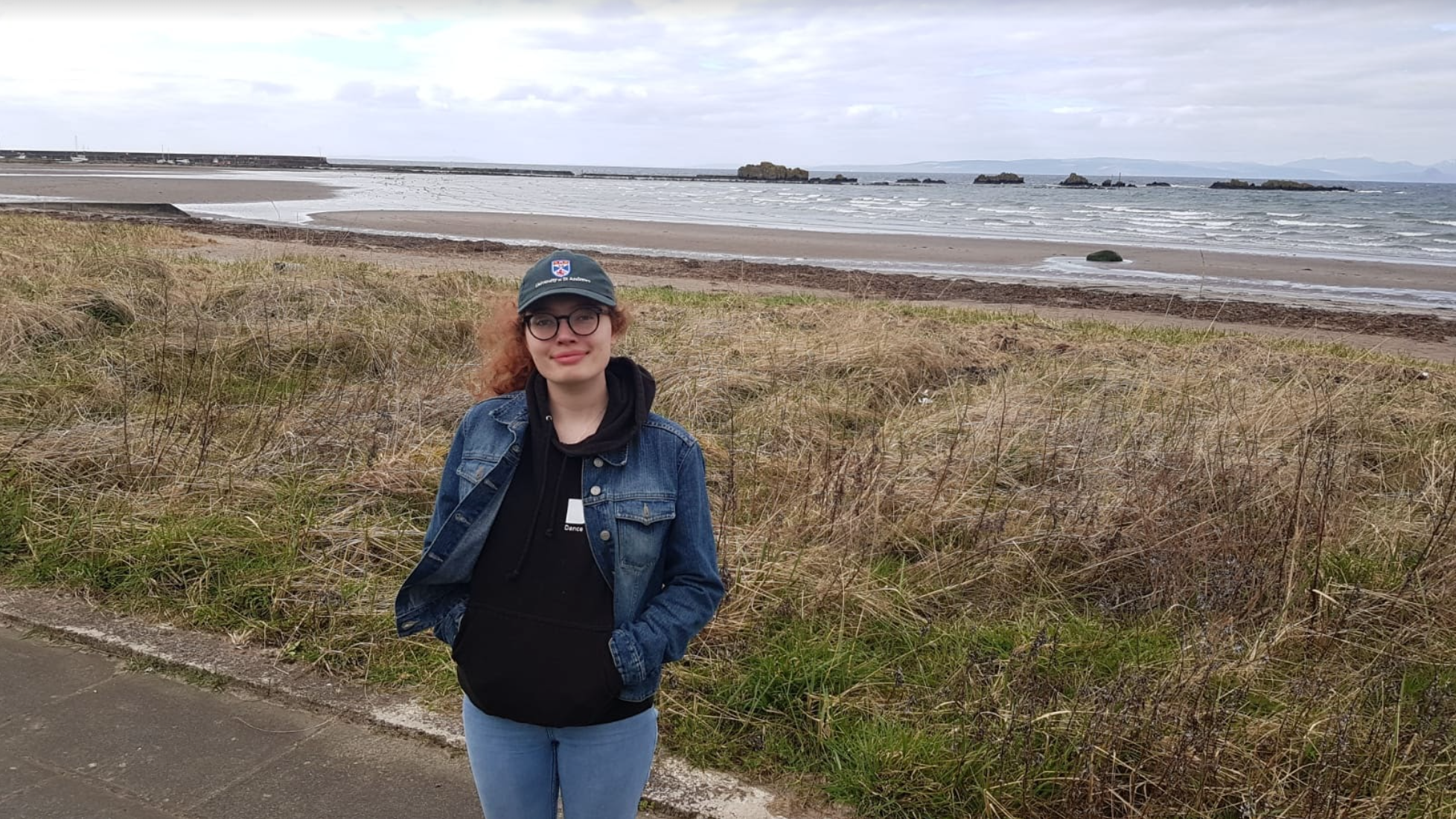Brain drain: Why the exodus of graduates from Northern Ireland must be stopped
Repelled by deep sectarian divisions and lack of opportunity, talented young people are fleeing in droves. Olivia Fletcher asks if the economic conundrum can ever be fixed


Richhill is a quiet enclave in County Armagh, Northern Ireland. With a population size of about 3,000, the modest village has what could be deemed the essentials: the local chippy, a convenience store, a doctor’s surgery, a pub or two and a smattering of churches.
Unless, like James Brown, you’re a young person desperate to see more of the world and seek out new opportunities.
Brown was itching to leave Richhill, where he grew up. “There’s no jobs for what I want to do in Northern Ireland, so I kind of had to move away,” he says. The 21-year-old is in his third year at the London School of Economics, studying actuarial science. He already has a job lined up with an actuarial firm in the capital when he graduates.
Many young people from rural parts of the UK want to move to bigger cities where the nightlife is livelier and the job market bigger. But there are additional incentives for students like Brown to leave Northern Ireland.
“Whenever you come away, you realise, ‘Jesus, how was I living there for that long and think this stuff is normal?’” he says. “It’s a very backward place. And the people I’d hang around with would be very bitter and hostile and it just seems like it’s stuck in decades past or behind where other places would be. So much of what happens there, it’s just normalised … since I’ve got away from that, I sort of pushed away from it even more.”
Even though Brown loves spending time with his family in Portrush on the north coast or in Donegal in the Republic of Ireland, unabating divisions largely between the unionist and mostly nationalist communities can be a turn-off. And he is not the only young person there who thinks so.
It has forced Northern Ireland to face a daunting economic task: how to stop so many students and qualified graduates from leaving and never coming back. The problem is concerning for the future, with no signs of slowing. It continues to stunt growth in the economy with fewer people able to take on high-skill jobs in the region. Sometimes called the “brain drain”, senior economist at Ulster University’s business school Dr Esmond Birnie says the problem is best explained as the “net out migration” of graduates and professionals.

“It’s not so much when people leave the region,” he says. “It’s when people leave the region because they feel they don’t have a choice. They feel somewhat compelled or forced by economic conditions … it’s where people, in this case in Northern Ireland, perceive a lack of opportunities within the regional labour market and therefore move to where they perceive there’ll be more opportunity.”
But what makes the problem unique to Northern Ireland? Research manager at Northern Irish think tank Pivotal Dr Ben Harper has just led one of the only existing studies on the causes of so-called brain drain. “Unlike cases like Wales, which has a similar sort of levels of outgoing students, we don’t attract the incoming students,” Harper points out. “It’s become very problematic for Northern Ireland.”
Cambridge graduate Abby Wallace, 22, who has also just finished a master’s degree at Queen’s University Belfast, grew up in Newtownabbey, a provincial town about seven miles north of Belfast, but is moving to London for a job at Business Insider. “Northern Ireland has two great universities but I just felt like I had more choice and more opportunity elsewhere,” she says.
And Cara Graham, 21, from just outside Dungannon in County Tyrone feels the same. “I grew up in the back arse of nowhere. So, I found that everyone sort of knew each other and, for example, people who I would meet who would be my age, my parents would know their parents from whenever they went to school. That kind of thing is really lovely, but it just wasn’t for me.”
The fourth-year chemistry student at St Andrew’s says: “I didn’t want to go to university and just be friends with the same people I was friends with in school. I wanted to expand my horizons a little bit.”
“I have friends from Malaysia and I have friends from, like Singapore, I have friends from the States, Canada, Brazil, like it’s a lot more international, and obviously from England and stuff,” she adds. “I feel like I’ve learned a lot about different cultures and stuff whereas you wouldn’t really get that so much at home.”
Wanting to live in a more diverse area is one thing that pushes young people away from Northern Ireland and pulls them to other university hubs, Harper’s study of around 300 graduates found. But he acknowledges that the causes of the brain drain are “multi-factored”, pointing to graduate employment opportunities, the social life and – most importantly, he says – the lack of community relations between Protestant and Catholic communities, the former generally being unionist and the latter nationalist.

“People don’t like living in a divided society, and also don’t see themselves in the political leadership that is present in Northern Ireland,” Harper says. “We’re speaking to 18-year-olds who have left Northern Ireland having never met a Protestant or Catholic, somebody from the opposite base. But we’re also speaking to 50 or 60-year-olds who are describing the same reasons why they left Northern Ireland.”
His study concludes that politicians must assess community relations now because, in his words, “the lack of action is leaving serious stagnation in Northern Ireland, both for students and society”.
One politician who is ready to admit that is Matthew O’Toole, a Social Democratic and Labour Party member of the legislative assembly (MLA) in Northern Ireland’s devolved assembly, and the economy spokesperson for his party.
“It’s frankly a sense among too many young people that the best thing to do is to get out,” he says. “And that isn’t just a function of our loosely performing economy. It’s the sense that there are too many social issues; it’s hard to progress.”
In April 2021, riots erupted near Abby’s home during a short burst of violence. Some unionists, angry about the lack of unionist leadership on issues including the Brexit protocol, took to the streets. Cars were hijacked and set on fire, while petrol bombs, bricks and bottles were thrown at police.

“I saw the wreck the next day, you know, I would drive past that all the time,” Abby says. “It was genuinely scary. I think things escalated really quickly that week and towards the end of the week, I was really anxious and it made me angry and it made me frustrated and kind of sad.”
“I definitely get disillusioned with politics in Northern Ireland,” she adds. “I feel like I don’t really fully feel represented by any party.”
For Harper, the message is clear: “Young people aren’t interested in orange and green politics,” he says. “They want jobs, they want equal rights for women, equal rights for gay people and trans people. And that’s just not what our conversations are often about in Northern Ireland.”
O’Toole, who represents a student-heavy area in south Belfast, says a new approach to politics is urgent, or else the brain drain could continue to worsen the economy. “If so much of our politics is based around the past, then the people who have more of the future to look forward to are going to necessarily be turned off.”

He adds: “That’s not to say by the way that we don’t need a mechanism for dealing with what’s called the past in Northern Ireland. We do – they’re legacy issues. But unfortunately, they’re used too often to beat one another over the head.”
The MLA understands how frustrating being a young person in Northern Ireland can be, having moved to Scotland for university and only returning recently to become a politician. He wants more university places in Northern Ireland’s two universities to be made available to students from here and says that jobs should be created for talented young people to solve Northern Ireland’s biggest problems.
That’s exactly what Mary Cousins, 22, from north Belfast, wants to do. She studied in London but has returned to Belfast to get a master’s degree in conflict resolution. “It’s something I’m aware of, you know, the peace process and how well it’s going and sometimes how it’s not going, so I would like to try and make some sort of contribution.”
She says: “Any time you go into Belfast city centre, you might see someone ‘preaching’ and it’s not uncommon to hear homophobia or to see horrible anti-abortion placards. I’ve noticed coming back almost how much, say, religion or conservatism still has a grip on this society.”
Politics is clearly divided in Northern Ireland. But Eoin McCaul, 22, who has grown up in Newcastle, County Down, says “sometimes I feel like it’s not actually as different as people make it out to be from other places”.

The Queen’s University politics, philosophy and economics student works part-time at a cafe in his hometown, nestled at the bottom of the rolling Mourne mountains, and wants to study his master’s degree in London or Manchester, where there are new things to see and do. “Even like somewhere like America you’ve got such a strong division between two main parties. And theirs might not be religious but there’s still that sort of political split.”
And senior economist Birnie sees the problem differently too. He thinks so-called brain drain is a symptom of an underlying weakness in the regional economy, rather than the cause.
“The point about the Northern Ireland economy is, among the major UK regions, traditionally, it has tended to be one of the lowest labour productivity regions and that has been so for decades, and indeed some data suggests that was true 100 years ago,” he says.
It can’t be denied that some social and political factors have contributed to causing net out migration. But Birnie, who has ample experience of making economic decisions during his time as an Ulster Unionist Party MLA between 1998 and 2007, says Northern Ireland has been characterised by a tradition of strong migration going back even to the 19th century. “So,” he says, “a lot of it is explicable, I think, by the economic and lower wage levels reflecting lower productivity. And therefore, I would suggest that’s probably where policymakers want to be looking or looking more.”
“It’s important not to just focus on people leaving the region,” he adds, hinting at what Northern Ireland’s economy could look like in future. “There is another aspect to this that is whether you can try make your region attractive to incomers. This could be in terms of international migration, but it’s also particularly relevant to the context of the universities and people coming in from other countries to study, particularly for postgraduate degrees, particularly in science and technology.”
Belfast has a booming tech and IT industry after all. But it may not be enough to attract students and graduates like Abby, Cara and James back. Harper’s study found that 88 per cent of graduates from Northern Ireland have no plans to return.

It has been 24 years since the Good Friday Agreement was signed. And, Birnie says, “the total population has continued to grow, total employment in the Northern Ireland economies continue to grow as well. So, you know, not everything has gone bad.”
The economist says that businesses here may need to be nudged into improving productivity in future, which means they could pay a higher salary. But he admits this won’t happen immediately, if at all, and adds it may always be inevitable that many 18-year-olds from Northern Ireland want to leave.
“My fear, what I think most likely – and here I am at the risk of being too pessimistic, but equally I would say trying to be realistic, especially based on past experience – is that things won’t change all that very much,” he says.
“In other words, there’s a sense in which the Northern Ireland economy is historically settled into what is sometimes called the low-level equilibrium. Things are roughly in balance, but it’s a balance in which you do have employment opportunities for people but that’s associated with relatively low wage levels or salary levels compared to Great Britain, alongside relatively low productivity. I’m not convinced that there’s very strong evidence that we’re going to break out of that low-level equilibrium over the next 10 to 20 years.”
But there is one thing that could change in the next 10 or 20 years, impacting the makeup of Northern Ireland’s economy in future. There is a live debate about the constitutional future of Northern Ireland, O’Toole points out. “I think that debate isn’t going to go away,” he says. “But, in a sense – and that is a part of the historical debate that happens here – I think the critical thing is that those debates have to happen in the context of the future, rather than simply the past.”
Students, graduates and young people from Northern Ireland are crucial to that debate. “I think people here on a day-to-day level are so friendly and funny, and I think a lot of that’s overlooked when you look on the broader level and say, ‘Oh, we’re still struggling with legacies of sectarianism or whatever’,” Mary says. “I think here actually is great and has the capacity to be even greater.”




Join our commenting forum
Join thought-provoking conversations, follow other Independent readers and see their replies
Comments